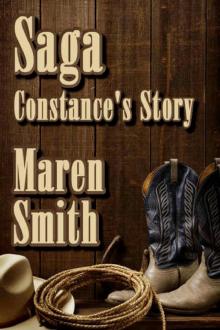- Home
- Maren Smith
Something Has to Give
Something Has to Give Read online
Something Has To Give
By
Maren Smith
©2013 by Blushing Books® and Maren Smith
All rights reserved.
No part of the book may be reproduced or transmitted in any form or by any means, electronic or mechanical, including photocopying, recording, or by any information storage and retrieval system, without permission in writing from the publisher.
Published by Blushing Books®,
a subsidiary of
ABCD Graphics and Design
977 Seminole Trail #233
Charlottesville, VA 22901
The trademark Blushing Books®
is registered in the US Patent and Trademark Office.
Smith, Maren
Something Has to Give
eBook ISBN: 978-1-62750-2856
Cover Design by edhgraphics.blogspot.com
This book is intended for adults only. Spanking and other sexual activities represented in this book are fantasies only, intended for adults. Nothing in this book should be interpreted as Blushing Books' or the author's advocating any non-consensual spanking activity or the spanking of minors.
Table of Contents:
CHAPTER ONE
CHAPTER TWO
CHAPTER THREE
CHAPTER FOUR
CHAPTER FIVE
CHAPTER SIX
CHAPTER SEVEN
CHAPTER EIGHT
EPILOGUE
Ebook Offer
Maren Smith
OTHER BOOKS BY MAREN SMITH
Kaylee's Keeper : Chapter One
Blushing Books Newsletter
Blushing Books
CHAPTER ONE
December 21st …
Captain Quint Rydecker beat the snow home, but only by a day, or perhaps even only an hour or two. The sky was a dismal gray. The air outside smelled like snow; the heater in his old truck was going full bore, and when he saw the beat-up mailbox that dotted the end of his last turn, he breathed a sigh of relief. At last he was home. Just in time for the holidays, too.
Oh. Joy.
Slowing down, he left Interstate 40 for the hard-pack dirt of his two-mile driveway, and then he stopped. There was a giant plywood sign affixed to the corner of his barbed-wire fence not far from his mailbox. Painted white with giant red letters, it read: ‘Farm Fresh Eggs - $2/doz. Cheese $5, Cream Cheese $3.’
He stared at the sign, eyebrows drawing steadily together in growing confusion. That sign didn’t make sense. He turned in the front seat of his pick-up and looked out across the spread of old pines, sagebrush and juniper (not to mention the endless stretches of jagged red rock and sand) that made up his 1,160 acre property. The same wide-open nothingness stood between him and any other earthly signs of civilization for as far as the eye could see in literally any direction. Then, he looked back at the sign again.
Where had it come from?
It looked weathered, but not as weathered as sixteen months in the Utah desert—subject to the wind, sand storms, blistering heat, and truly hellish winter conditions—should have made it look. That sign could not have been any newer than sixteen months, and he knew that because sixteen months almost to the day, was exactly how long it had been since Quint had received his marital discharge papers.
Maydeen’s attached letter hadn’t begun with ‘Dear John’. Maybe if it had, his heart could have been better prepared. But no, her divorce letter had instead started with, ‘I can’t do this anymore’ and from there degenerated into ‘I’ve met someone else’ and finally ended by stating, ‘I’ll leave the keys in the cookie jar on the fridge’.
Apart from a box of holiday snacks randomly sent from well-wishers back in the States, that had been his last letter from home, and Quint had received it two months before his tour of duty in Afghanistan was scheduled to end. He’d sat there stunned, going over the entirety of that letter, as well as the attached divorce papers, for so long the words began to blur. She wasn’t taking anything, not even half his pension—all she wanted was out. When he couldn’t read it anymore, he’d simply signed on all the legal lines, then got up, walked across camp to the temporary HQ set up behind the mess and re-enlisted for another year. Every guy in his division thought he was crazy, but what the hell did he have to go home to after a letter like that?
Two tours in the Middle East, however, gave a man a lot of time to think. He’d thought about all the years he’d given the army—thirteen in all—and about what those years had given him—a few good scars, a few good memories and a helluva lot of bad ones—and an empty house with no wife and no promise of future happiness there to greet him when he finally arrived home. Thoughts like that could make a man reevaluate what the hell he was doing with his life. It could even make him fill out the regulation paperwork, and instead of signing on for yet another tour, make him retire.
Now Quint stared at the sign, and he just couldn’t understand it. Before the divorce, he’d sent Maydeen damn near his entire paycheck. Captain’s wages wouldn’t make them both rich, but it wasn’t exactly pauper’s pennies, either. The house and homestead were both paid for. Electricity, water, and natural gas came automatically out of his bank account every month. What had she done with the rest that she had to sell eggs to make ends meet? And where was she getting the eggs from anyway? They’d never had livestock. Hell, this was the first he knew that Maydeen was aware of which end of a chicken that eggs came from.
He started to get out of his truck and then changed his mind. He’d rip the sign down tomorrow, if he thought of it. For now, he just wanted to go home.
Shifting back into drive, he bumped and jostled from rock to rut all the way down the long dirt driveway until he spotted his second surprise: he had goats—a whole damn herd of them, grazing on the sage and brush that littered every inch of his property about a mile or so from the house. He must have a fence down somewhere. It was the only thing he could think of. Either that, or one of his very remote neighbors was taking advantage of the fact that no one now occupied this property and was fattening their herd on his land.
Well, tomorrow was early enough to put a stop to that, too. Frowning now, Quint glared at the goats, which were coming en masse at a trot to greet his truck, and continued on toward home.
The old two-story farmhouse rose out from behind the juniper and brush, as he wound his way around the last dusty corner and rumbled up to park in front of the steel-built and detached garage. It needed paint, but that was only to be expected. Just about everything out here—the shed, the barn, the silos from back when his grandpappy was still trying to make a farm out of this poorly-irrigated dust heap, as well as the cattle and horse corrals still standing from his father’s equally-fruitless days of trying to wring a profit out of ranching—needed some form of paint and repair. The only reason any of it looked as good as it did was because just before running off to play soldier, Quint had hired all-around handyman, Enis Carroll to keep up with repairs. He’d obviously done his job—right up until he decided he’d rather keep up with Maydeen. Quint guessed he ought to be grateful there was anything standing at all.
Welcome home and Merry Christmas, Captain Rydecker, he thought bitterly and started to get out.
Damn, it was cold. His breath steamed in the air, as he rounded to the back of his truck. As he heaved his duffel bag up over his shoulder, a soft tinkling sound caught his attention. Apart from noticing the need of a fresh coat of paint and a few repairs, Quint hadn’t paid that much attention to the house. That changed the instant he heard the wind chimes. Despite the fact that Maydeen had never been a fan of noisy, useless contraptions, three wind chimes were hanging off the front porch eaves. Crystal hummingbirds and silver pipes sang in bright harmony every time the evening b
reeze kicked up from the west—which was often; a storm was coming and there was always a breeze blowing this time of year. Next to them, bright copper chimes were higher-pitched, sounding more like a musical rain shower. On the far corner of the porch, the wooden ‘chimes’ sounded clunky and hollow.
Quint stared at each of the three in turn. Early on in their marriage, he had bought his young wife a set of wind chimes for her birthday. The argument that had resulted pretty much guaranteed he never made that mistake again, so why would she have hung these before she left?
Obviously, Enis gifted better wind chimes. Equally obviously, since she hadn’t bothered to take them with her, Maydeen’s stance on useless, noisy things hadn’t much changed.
Then he noticed the curtains. “What the hell?”
There wasn’t a single window-dressing that looked familiar to him. Not one. There was a welcome mat on the front porch and a bristled hedgehog boot scraper. Peeling paint or not, this did not look like a house that had been abandoned for the last sixteen months.
Then the breeze shifted direction and Quint caught the scent of fresh-baking bread and all at once, it hit him. Like a shotgun blast direct to the chest with both barrels. Maydeen hadn’t moved out after all. And if she was still living here, then that stood to reason she must have moved that home-wrecking handyman, Enis, into his house, his bedroom—his bed!—with her.
Quint’s temper could have been a car commercial; it went from zero to redline in less than two-point-five seconds, and the next thing Quint knew, he was marching for the house. He stalked down the front walk (once a plain dirt path, it was now lined on both sides by whitewashed rocks and empty flower beds already bedded down for the impending winter) and up the three porch steps. On one of the porch columns, there was another neatly-printed price sheet for the eggs and cheese along with instructions to “knock loud”.
Half expecting the locks to have been changed, he grabbed the doorknob and fished for his key ring, but he didn’t need it because the door wasn’t locked. It swung open at a turn and the heavenly aroma of fresh baking simply engulfed him. It was far and away the best homecoming he could have expected and yet, at the same time, it was the worst.
His temper exploded. “Maydeen, God damn it! You get your—”
“Butt” choked off to silence in the back of his throat when a woman he didn’t know stepped through the kitchen doorway. They stared at one another in equal surprise. Her eyes were huge, the same mahogany as her hair, pulled back as it was in a single ponytail, the long braid of which hung down her back almost to her waist. He recognized her clothes, from the blue knit sweater to the jeans with the cupid hearts on the pockets, even the off-white sneakers on her feet—all of which were Maydeen’s. But the woman who was filling them out (in all the right ways, some part of his brain was only too happy to supply) was not.
“Who the hell are you?” Quint asked, more surprised than angry now, though he definitely didn’t sound that way.
“Who the hell are you?” the woman returned, seeming to get a little angry herself. “Get out of my house! You can’t just walk in like this!”
“Wrong,” he argued and came more fully in the door. He looked around the living room, noting the couch he’d bought Maydeen shortly after their marriage, his daddy’s old analog TV, his great granddaddy’s clock above the mantel and his family pictures—his pictures—on the walls. “Wrong, lady,” he said again, with less anger now, but a lot more confusion. “This is my house, my property, and my land outside. So I’ll ask you again, and this time I’d appreciate an answer: Who are you, and what are you doing in my house?”
A strange look came over her then. Her eyes flicked from him to his military picture on the wall just past his shoulder. Something that seemed to him like one part nervousness and guilt quickly buried beneath nine parts stubborn defiance moved across her features.
“Elsie Redding,” she said fiercely. When her eyes snapped back to his, they flashed mahogany fire. “And I’ve got two words for you, buster: squatter’s rights!”
* * * * *
Elsie Redding always knew that someday the other shoe would drop, and here it was. Someday had arrived, and there—standing in the front yard, yelling at the Uintah County sheriff—was the other shoe. Captain Quint Rydecker. Of all the dilapidated, abandoned houses, why did she have to pick one belonging to a man who’d only been away in the military?
In the back of her mind, the tiny voice of her conscience—a voice she had tried really hard these last eight months not to listen to—whispered, “If you’d known, would you have done it any differently?”
The answer was, probably not.
She’d been living here now almost eight months. Sometimes it felt like a dream. Sometimes it was hard to remember what it had felt like; all that desperation, driving down I-40 with nothing in the rearview mirror but a mountain of debts, a lot of bad decisions, and the kind of man that left a girl with nothing but a drained bank account. She’d put every penny she had into the gas tank and, with no clear destination in mind and no idea what she was supposed to do once she got there, Elsie’s entire plan for escape had come down to one simple ill-thought-out step: drive until you run out of gas.
So that’s what she did. And when the engine finally ran out of fumes, sputtered and died, it wasn’t another town that she found herself stuck in. It was the middle of God-awful nowhere, with miles and miles of scrub-littered nothingness stretching on for miles before her, behind her, and all to her left. On her right were the remnants of mountains so eroded now that long lines of rocky formations bowed up out of the ground like the giant backbones of creatures frozen in the act of diving into the dirt and clay. Two of those creatures were diving right up beside the road, passing one right beside the other and creating a steep rock chasm, so deep between them that, in an instant, she knew nothing that fell in would ever crawl its way out again.
In that moment, that one, tiny, half-thought-out moment, she was tempted to test that theory. All she would have had to do was step off the road, walk three or so steps down the steep embankment to where the ground just fell away and jump.
No one would ever have found her.
But of course, she didn’t jump. What she had done, instead, was put her car in neutral, hold the steering wheel with one hand and push with her shoulder against the car frame until gravity took over. She still harbored hope that enough dirt and rocks had come crashing down on top of her car to ensure no one would ever find it.
Then she just started walking.
To this day, she had no idea how far she must have gone or how many of those overgrown dirt roads she’d passed before she realized the sun was going down, that she hadn’t seen another car all day long, and that it was starting to get cold. Absolutely no thought went into her decision to veer off the road and keep walking out into the desert brush. By the time she saw the house, the sun was almost gone. No lights were on in any windows. No one looked to be at home. By the time she was close enough to climb the front porch steps, she’d known no one had been home for quite some time. There was too much dust on the windows for anyone to be living here. At least, that’s what she’d thought, right up until she touched the door and it simply opened up.
Who would leave a house and not lock up? She remembered thinking that very clearly as she’d pushed the door open and taken her first hesitant step inside. What’s more, why would someone leave it fully furnished, with canned foods still on the pantry shelves, clothes hanging in the closets, and the power and water still working?
Elsie remembered walking back outside in a strange state. She’d sat down on the front porch and waited, and waited, until long after the sun went down and the absolute darkness of country life settled over the juniper and scrub. She’d waited, expecting at any second to see headlights coming up the long driveway, but none ever had. It got very cold that night. She’d held out, shivering, for as long as she could, before walking back inside and closing the door. For several days, she’d
pretty much lived on the center cushion of the couch, waiting for someone to come home, but no one ever had. Eventually, she’d stopped waiting. Eventually, she made herself at home.
For eight months.
And now, Captain Quint Rydecker was home and she was just supposed to walk away? Leave everything she had built up for herself? Quietly accept the fact that she had nothing—no money, no home, no future—all over again?
Arms folded across her chest, Elsie stared out the window, hating the man now pacing up and down in front of the sheriff, casting angry glares back at the house. Through the window she couldn’t quite make out what they were saying, but that didn’t matter. Captain Rydecker had abandoned this house. It was hers now, and she wasn’t leaving. Wherever he’d been these last eight months, he could just take himself right back. And if he refused to leave voluntarily … well, her eyes narrowed to stubborn slits, it might take a day—two at most—but she was good at getting rid of pests. Like the bats she’d found roosting in the attic and pantry, Elsie was going to get rid of him, too.
CHAPTER TWO
“But this is my house!” Quint shouted, thumping at his chest with both hands. “Mine!” By all accounts, such power displays worked well for apes; humans, not so much. Sheriff Buster Harlowe stood stoically chewing his gum and didn’t seem much impressed. “I’m giving you permission, for God’s sake! Why can’t you drag her ass out of there? Arrest her for trespassing—or something! Do your damn job, man!”
Sliding his gaze back to the house, the sheriff continued to chew his gum. “Those look like new curtains,” he finally said.
Quint could feel his temper slip a little at that. He struggled to rein it back in. “Yeah, those are new curtains. Those are new goats out in my field. I’m pretty sure she’s got new chickens around back somewhere because there’s also a new fucking sign at the front of my driveway and posted on the porch! She’s selling eggs and cheese out of my—” he thumped his chest again. “—my house!”

 Ladder 54: Five Firefighter Romances
Ladder 54: Five Firefighter Romances Her Royal Daddy
Her Royal Daddy Dirty Daddies: 2020 Anniversary Anthology
Dirty Daddies: 2020 Anniversary Anthology Her Vampire Master (Midnight Doms)
Her Vampire Master (Midnight Doms) His Next Ex
His Next Ex Owning O
Owning O Daddy's Little Librarian
Daddy's Little Librarian Super Daddies
Super Daddies Stolen Moments: A Victorian Time Travel Romance
Stolen Moments: A Victorian Time Travel Romance Daddy Shark
Daddy Shark Seducing Sandy
Seducing Sandy The Locket
The Locket Build-A-Daddy
Build-A-Daddy Angel of Hawkhaven
Angel of Hawkhaven Something Has to Give
Something Has to Give Katy Run Away
Katy Run Away Jinxie's Orchids
Jinxie's Orchids Fearless
Fearless Warming Emerald
Warming Emerald Jade's Dragon
Jade's Dragon Warming Emerald: The Red Petticoat Saloon
Warming Emerald: The Red Petticoat Saloon Binding Brinley (Captives of Pra'kir Book 1)
Binding Brinley (Captives of Pra'kir Book 1) Saving Sara (Masters of the Castle)
Saving Sara (Masters of the Castle) Maddy Mine
Maddy Mine With Hearts Aflame: Valentine's Day Box Set
With Hearts Aflame: Valentine's Day Box Set Masters of the Castle: Witness Protection Program
Masters of the Castle: Witness Protection Program Have Paddle, Will Travel (Corbin's Bend Season Two Book 7)
Have Paddle, Will Travel (Corbin's Bend Season Two Book 7) Chasing Chelsea (Masters of the Castle)
Chasing Chelsea (Masters of the Castle) Saga: Contance's Story
Saga: Contance's Story Last Dance for Cadence
Last Dance for Cadence Kaylee's Keeper
Kaylee's Keeper Mischief Under The Mistletoe
Mischief Under The Mistletoe Sweet Sinclair (Masters of the Castle)
Sweet Sinclair (Masters of the Castle) Black Sheep
Black Sheep Last Dance for Cadence (Corbin's Bend)
Last Dance for Cadence (Corbin's Bend) Varden's Lady
Varden's Lady Holding Hannah (Masters of The Castle)
Holding Hannah (Masters of The Castle)